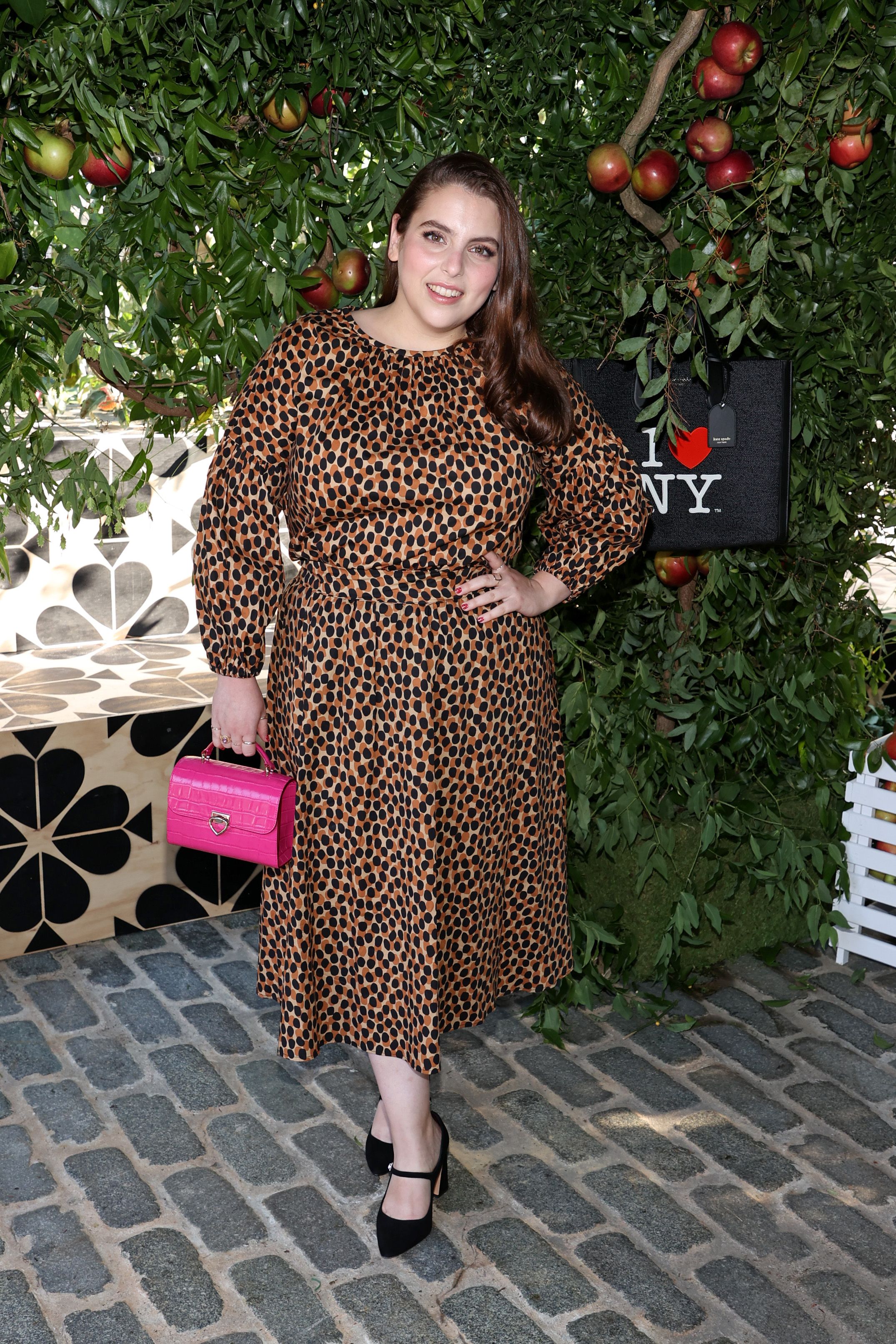For the first time in 18 months, Beanie Feldstein’s back in New York “for good,” and she’d like to state for the record that she’s thrilled about it. It’s not that filming Impeachment: American Crime Story and donning the blue beret of Monica Lewinsky wasn’t one of the most extraordinary things to ever happen to the 28-year-old Booksmart actress. It’s that, well, it’s nice to be Elizabeth Greer “Beanie” Feldstein today, rather than a much-maligned former White House intern and ’90s icon—no disrespect to her good friend Lewinsky, of course.
On an ostentatiously sunny morning during New York Fashion Week in early September, Feldstein flits into Kate Spade’s pop-up apple orchard like a bird alighting onto a branch, all chirp and cheer. Dressed in all-leopard print and a neon pink handbag, she’s here to mark the brand’s new I Love NY collection, and she gives no sign that she’s still wrestling with the emotions of the show she wrapped only two weeks prior. At least for the moment, she’s shaken off the weight of a story plagued by misogyny, betrayal, and abuse of power. Feldstein’s reclaimed a little piece of Lewinsky’s tale, she thinks, so it feels justified to have some coffee, a honey-crisp apple, and a little celebration.
“I’ve been to so many events for [Kate Spade], and they’re always so joyful. It reminds us of the artistry, the creativity of this city. I always lean on the classier, more simplistic side [of fashion], but always with color and fun. I love talking to people; I’m very gregarious,” Feldstein says, then smiles, as if to add, Obviously.
Yet, as we talk more, a more contemplative side of Feldstein emerges. There’s a glimpse, then, of how well the young actress had to know Lewinsky, and how she found a unity with a woman so despised for her affections. As FX rolls out the latest episode of Impeachment, in which Linda Tripp (Sarah Paulson) betrays Lewinsky by taping her phone calls, Feldstein’s most heart-wrenching scenes are finally meeting the public’s scrutiny. Below, Feldstein discusses how she approached her most demanding role yet—and whether she lives with any regrets.
When you learned that [show creator] Ryan Murphy had you, and you alone, in mind for this role, what was your reaction?
I pretty much fell to the floor. I was in London, and I was in my partner’s apartment, and I had to hold onto the handle of the oven door because I was just like…I needed to steady myself. I think Ryan is one of the most prolific, remarkable talents ever to exist, and his work is so revolutionary. Then he asked me to be a producer, and that was one of the most empowering moments of my whole life. His shows speak for themselves in their artistry, their creativity, the way they push social boundaries, and he asked me to come on his show not only as an actor but on the producing team as well. It’s changed my life.
Did he ever explain to you why he wanted you for the job?
No. But Monica actually said, and I didn’t know this [later], but she watched Booksmart, which was amazing. She very kindly tweeted about the movie, so I knew that she’d watched it. When she watched it she was like, “That kind of reminds me of me when I was in high school.” So both [Lewinsky and Murphy] were having the same thought at the same time.
Was there any hesitation going into a project like this, centered around such a high-profile event?
Never hesitation, but always a big sense of responsibility. There’s a difference there. There was no hesitation, but the weight of the responsibility and the importance of what we were doing. For me, obviously knowing Monica personally, it was important to play her honestly and with care and with nuance and humanity.
What advice did Lewinsky give you when it came to embodying her, especially at that very particular time in her life?
At the beginning of the chronology of the story, it’s 1995 for Monica. It’s earlier for other characters, but Monica’s just graduated from college in Oregon. She’s moved to Washington literally four weeks after she graduated college. I think we all know that moment, if we’re old enough to know that moment. You know who you are in the context of your family, your home life, the institution of a school. Who are you when you’re out in the world? That moment is filled with incredible excitement and curiosity. So, that’s what [Lewinsky] really encouraged me to understand. She was both extremely savvy and incredibly naïve, incredibly confident yet insecure.
Having seen the show now, do you feel you’ve done justice to the story? Do you have any regrets?
Well, I think it’s a very complicated question. I wouldn’t change a thing about what we’ve done as far as the crafting of the scripts, the incredible direction, the casting. But as an actor I’m always nit-picky. I can always find things that I’m like, “Come on, Beanie. Come on.” I nip at myself, but as a producer I can step back…We worked hard on this thing. It was a 10-month shoot. It was about a three-year process to get from when I got the call to now. We put everything into it. I’m incredibly grateful to be a member of that cast and that crew, and in that way I’m very proud. As an actor, I’m still learning, you know?
This interview was edited and condensed for clarity.
This content is created and maintained by a third party, and imported onto this page to help users provide their email addresses. You may be able to find more information about this and similar content at piano.io
By:






